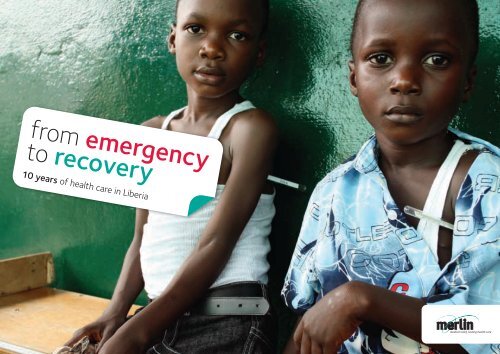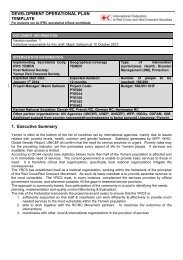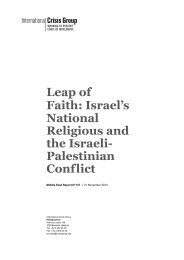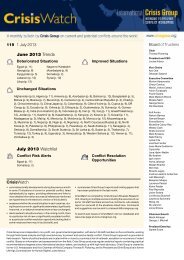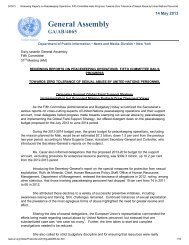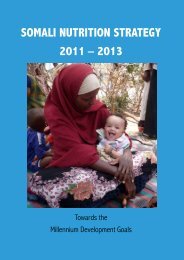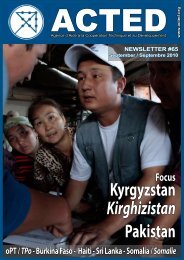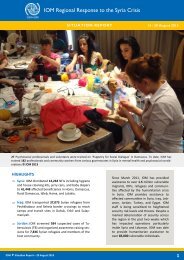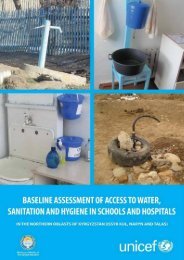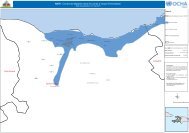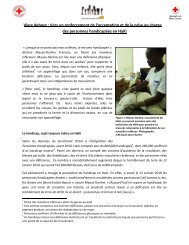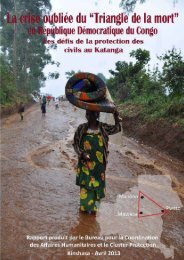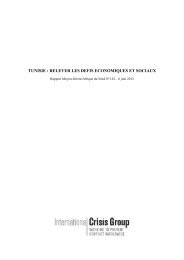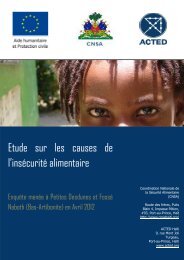Download PDF (720.25 KB) - ReliefWeb
Download PDF (720.25 KB) - ReliefWeb
Download PDF (720.25 KB) - ReliefWeb
You also want an ePaper? Increase the reach of your titles
YUMPU automatically turns print PDFs into web optimized ePapers that Google loves.
from emergency<br />
to recovery<br />
10 years of health care in Liberia
02 from emergency to recovery<br />
From the Liberian Health Minister<br />
I have the honor of expressing my<br />
heartfelt gratitude and congratulations on<br />
Merlin’s 10th anniversary of humanitarian<br />
service in Liberia. Merlin has been<br />
instrumental in the role of transforming<br />
Liberia’s health care system from an<br />
emergency to a development stage.<br />
I am very impressed with what<br />
Merlin is doing today. Not only are<br />
they providing quality health care,<br />
but they are also helping us with the empowerment of our people and<br />
with capacity building. Empowering us to do the work ourselves - that<br />
is of great importance to me.<br />
What I would like to see in Liberia is what we still do not have. In 1978,<br />
when we had our first primary health care conference, we said that we<br />
would like to have health care for all by the year 2000. It is 2007 and<br />
we are so far away from that.<br />
I want people to know how to help themselves to protect their health.<br />
If we had roads to the communities where it takes three or four days to<br />
walk to, then we could deliver health messages there. And once people<br />
have that information, the health care they seek should be accessible<br />
and affordable to them all.<br />
Human resources for health is a big challenge. This year our total health<br />
budget is US$15 million, which is just a fraction of what it would cost<br />
to recruit the number of personnel and to purchase the medicines and<br />
equipment we need to deliver a basic package of health care for all.<br />
The government and the people of Liberia are grateful for the<br />
contribution Merlin has made in helping the Ministry of Health & Social<br />
Welfare to rebuild the national health care system. Merlin has set an<br />
excellent example of effective humanitarian response in providing<br />
health care assistance to the people of Liberia.<br />
Dr Walter T Gwenigale Minister of Health & Social Welfare, Liberia<br />
Merlin first started providing emergency medical<br />
aid in Liberia at a time of great instability, and was<br />
one of the few international agencies to remain<br />
working there during intense fighting at the height<br />
of the conflict. Ten years on, as the West African<br />
nation has moved into a period of relative peace<br />
and optimism, Merlin’s work has evolved to assist<br />
the Ministry of Health in rebuilding a sustainable<br />
health system for a population which suffers some<br />
of the worst health problems in the world. This<br />
report recounts Merlin’s achievements over<br />
the past decade and explores how these<br />
could be built on in the coming years.
03<br />
10 years of health care in Liberia<br />
Two year old Towah Gelah examined<br />
by physician assistant Lorenzo Dorr.<br />
Starting up as fragile<br />
peace is restored<br />
In 1997, seven years of civil war in Liberia came to an end when<br />
former faction leader Charles Taylor won a landslide victory in the<br />
presidential elections.<br />
The conflict had left nearly one million Liberians displaced within<br />
and outside the country. Security was improving as a nationwide<br />
disarmament programme had begun, but the health care system,<br />
along with every other form of infrastructure, had taken a<br />
battering. Clinics and hospitals had been looted or destroyed, and<br />
many trained medical staff had left their jobs or fled the country.<br />
It was against this fragile backdrop that Merlin carried out<br />
assessments of the country’s most pressing medical needs in<br />
1997. The lack of basic health care services was deemed to<br />
be most serious in two counties: Lofa and Nimba.<br />
Several non-governmental organisations (NGOs) were operating<br />
in the capital Monrovia at the time, but few took the risky<br />
decision to venture out of the city. This meant that health facilities<br />
in rural areas like Lofa and Nimba were barely functioning, with<br />
acute shortages of staff and medicines, and were in urgent need<br />
of assistance.<br />
Sarah Hodge, Merlin’s Reproductive Health Manager, explains<br />
why the organisation started off where it did: “Merlin’s team<br />
felt that they had to go to the rural areas. The needs of the poor<br />
in those counties were very high, especially as far as medical<br />
provision was concerned.”<br />
“At the time there were a lot of NGOs in Monrovia and many<br />
were still afraid to go to other areas. People thought if they did,<br />
they might be killed.”<br />
1 Situation Analysis of the National Response to HIV/AIDS in Liberia, World Health Organisation/Ministry of Health<br />
/United Nations Development Programme<br />
Across Lofa, the lack of health care was detrimental, not just for<br />
the local population, but also for hundreds of refugees from Sierra<br />
Leone and Guinea, and displaced Liberians living in makeshift<br />
camps. Merlin moved in and quickly restored services at a number<br />
of health facilities, providing vital health care and distributing<br />
emergency medical supplies.<br />
A similar programme began in Nimba, where Merlin worked with<br />
the health authorities to deliver primary health care and essential<br />
medicines. Maternal death rates in Liberia were among the highest<br />
in the world – estimated at 780 per 100,000 live births 1 – so<br />
Merlin placed an emphasis on strengthening maternal health care.<br />
Hodge, who joined Merlin in early 1998, recalls her involvement<br />
with the Nimba programme: “We were trying to build the capacity<br />
of the clinical staff by organising refresher courses for them. I<br />
was training traditional birth attendants and community midwives<br />
because at that time, the maternal and infant mortality was<br />
very high.”<br />
By 1998, Merlin had built up its programme to support 22<br />
health centres and two hospitals across Lofa and Nimba. But the<br />
following year, Merlin staff felt the impact of worsening security<br />
when dissidents from Guinea launched a series of attacks in<br />
northern Lofa. Midwife Sara Nam, logistician Dave Heed and<br />
Dr Mike Roe, were among six foreign aid workers kidnapped by<br />
rebels in Kolahun town and taken towards the Guinea border.<br />
“They were initially quite aggressive but once they realised we<br />
were co-operating, that aggression eased off,” recalls Heed.<br />
“We were relatively well treated, and I think part of the reason<br />
was because they recognised who Merlin was. We had a good<br />
reputation, even back then.”
04 from emergency to recovery<br />
Thankfully, after negotiations with British officials,<br />
all the aid workers were freed unharmed several<br />
days later. The incident and the increasing levels of<br />
violence that followed led to the suspension of the<br />
Lofa programme.<br />
In 2000, Merlin identified significant health needs<br />
among refugees fleeing to Liberia from the civil war<br />
in neighbouring Sierra Leone. More than 30,000<br />
had arrived since 1991 and were totally dependent<br />
on humanitarian aid.<br />
Former faction leader<br />
Charles Taylor wins<br />
presidential elections<br />
Fighting resumes;<br />
peacekeeping<br />
forces leave<br />
Merlin focused on improving the knowledge<br />
and practice of health care among the refugee<br />
population in Montserrado and Grand Cape Mount<br />
by training more than 350 Sierra Leonean health<br />
professionals and community health workers. Health<br />
education was also conducted to raise awareness of<br />
malaria, HIV, diarrhoea, breastfeeding, nutrition and<br />
family planning among 4,000 refugees.<br />
Rebel forces from<br />
Guinea launch<br />
attacks in Lofa<br />
In the thick of battle<br />
This photograph was taken just moments after a shell landed<br />
in the Greystone compound at Mamba Point, Monrovia, in July<br />
2003. Pictured at the front left is Dr Clement Peter, Merlin’s<br />
Medical Co-ordinator at the time.<br />
Dr Clement and his team were on the scene attending to the<br />
wounded and shuttling them to the trauma unit at JFK Hospital<br />
for further treatment. “I remember that last shelling very well.<br />
I think 22 people were affected, with six or seven people dying<br />
instantly,” Dr Clement recalls.<br />
After making an immediate assessment of the survivors,<br />
Dr Clement decided that the man on the stretcher should<br />
be his first priority.<br />
“We thought that he had a good chance of survival, so I was<br />
moving him quickly to the ambulance before going back to<br />
get another patient,” says Dr Clement.<br />
Throughout this final year of the war, Merlin co-ordinated<br />
a huge relief effort, which included a city-wide ambulance<br />
service, construction of 400 latrines and the provision of<br />
7 million litres of clean water.<br />
Magnus Wolfe-Murray, Merlin’s Country Director at the time,<br />
explains how they kept going under such difficult circumstances:<br />
“We knew for certain that if we were not there to serve these<br />
people, there would be nobody else to do the job. We saved<br />
so many people every day we had no way of keeping count.”<br />
Liberian forces launch<br />
offensive against<br />
rebels in the north<br />
UN Security<br />
Council re-imposes<br />
arms embargo<br />
1997 1998 1999 2000 2001
05 10 years of health care in Liberia<br />
Security deteriorates, but<br />
Merlin scales up operations<br />
In 2001 Merlin began working in two new counties-<br />
Grand Bassa and Rivercess - as part of a push to<br />
improve access to and uptake of essential sexual<br />
and reproductive health services.<br />
At the time, there were only four certified midwives<br />
in Grand Bassa and one in Rivercess. Merlin took an<br />
integrated approach, by creating and supporting<br />
networks of trained traditional midwives. A<br />
community education programme to reduce high<br />
rates of teenage pregnancy was launched, which<br />
included raising awareness of family planning and<br />
sexually transmitted infections. As well as<br />
constructing four new clinics and renovating 29<br />
existing ones, Merlin installed solar panels at these<br />
health facilities to ensure that mothers could deliver<br />
in safety at night. By the end of the year, the clinics<br />
had recorded 6,400 antenatal care visits and a 20 per<br />
cent increase in uptake of family planning methods.<br />
Sumo Goyah, now Merlin's Clinical Supervisor for<br />
Montserrado, oversaw the immunisation programme<br />
in Rivercess. “When we got there, there were only two<br />
More than<br />
50,000 people flee<br />
renewed fighting<br />
Fighting intensifies;<br />
rebels battle for<br />
control of Monrovia<br />
nurses and one physician’s assistant serving 18 health<br />
facilities. There were no doctors at all. It was really<br />
a great task for Merlin to take on.<br />
“We started to educate people about immunisation.<br />
We started training the traditional birth attendants to<br />
strengthen their midwifery skills, and we supplied clinics<br />
with vaccines. I'm proud to say that Merlin was able<br />
to help thousands of people.”<br />
Despite increasing violence in 2002, Merlin scaled up<br />
its operations further in Grand Bassa, Rivercess and<br />
Sinoe counties, where it began renovating clinics and<br />
providing refresher training for local health staff.<br />
As the year progressed, the security situation in the<br />
south and east of the country began to deteriorate<br />
rapidly. Merlin launched emergency responses for<br />
thousands of refugees and returnees in both Grand<br />
Gedeh and Nimba, providing medical care and health<br />
education, as well as chlorinating water supplies.<br />
International donors<br />
pledge more than $500<br />
million for reconstruction<br />
Presidential<br />
elections held<br />
A Survivor’s<br />
Story<br />
Musu Flome was 16 when fighting erupted in her home town<br />
of Buchanan in 2003. For weeks, she had been experiencing<br />
severe pain in her abdomen.<br />
Musu suspects that the poor quality of food she had been<br />
eating was responsible for what culminated in emergency<br />
surgery at the Merlin-supported hospital in Buchanan.<br />
At the height of the fighting, Musu was in so much pain that<br />
she knew she had to get urgent medical treatment. She had<br />
an infected bowel, and was literally hours away from death.<br />
“Outside when there was fighting it was so dangerous - you<br />
couldn't go outside. We had to wait until it was quiet for a time<br />
and then they carried me to the hospital.<br />
“The doctors cut the infected section out. They then sewed<br />
me back together again. They saved my life.”<br />
Now 20, Musu still lives in Buchanan where she is attending<br />
cookery classes.<br />
“I'm learning how to bake,” she adds. “Any type of bread you<br />
want, I can make it. Perhaps I will open a bakery one day.”<br />
Ellen Johnson-Sirleaf<br />
inaugurated as President<br />
Charles Taylor’s war crimes<br />
trial begins in The Hague<br />
2002 2003 2004 2005 2006 2007
06 from emergency to recovery<br />
© Tugela Ridley<br />
Training midwives<br />
for safer deliveries<br />
Maternal mortality rates in Liberia are among the highest in<br />
the world. According to the World Health Organisation, Liberian<br />
women face a one in 16 lifetime risk of dying from pregnancyrelated<br />
causes. This is why maternal and child health has become<br />
an integral part of Merlin's work in Liberia.<br />
Because of the lack of professional maternal care services, leading<br />
female members of the community take on the role of midwife.<br />
These women have had no formal medical training, and rely on<br />
knowledge that has been handed down through generations.<br />
They are, however, well respected, and many women prefer to<br />
seek their services rather than to deliver at health facilities.<br />
Merlin offers a six-month training programme for traditional<br />
midwives, as well as refresher courses for those who wish to keep<br />
their skills up to date, with the aim of reducing maternal deaths.<br />
Over the past decade, more than 20,000 women have received<br />
training through Merlin initiatives.<br />
Trainee traditional midwife Gbatee Kollie (pictured, above<br />
right) says, “The more I can learn, the more I can help my<br />
Liberian sisters.”<br />
The height of the conflict<br />
In 2003, renewed fighting forced the suspension of<br />
Merlin’s programmes in Sinoe and Rivercess. As rebel<br />
groups rampaged through the country, their attention<br />
began to turn towards Monrovia. Merlin’s operations<br />
there in the second half of 2003 have been acclaimed<br />
for the courageous actions of staff during what would<br />
be the culmination of the war.<br />
In June, rebels launched two offensives – later<br />
nicknamed ‘World War One’ and ‘World War Two’ –<br />
on the capital, both of which were repelled by<br />
government forces. July saw the arrival of ‘World War<br />
Three’. A ceasefire agreed upon in Ghana was broken<br />
and chaos ensued. More than 600,000 people fled<br />
their homes and an estimated 1,000 civilians were<br />
killed. The street scenes in Monrovia – frightened<br />
civilians walking amid piles of severed bodies - were<br />
nothing short of horrific.<br />
Under the leadership of Country Director Magnus<br />
Wolfe-Murray and Medical Co-ordinator Dr Clement<br />
Peter, Merlin worked in extremely intense and, at<br />
times, harrowing circumstances.<br />
Barrie Cherinoh, employed by Merlin as an ambulance<br />
driver at the time, recalls the dangers they faced:<br />
“The Country Director and Medical Co-ordinator were<br />
so courageous. Whenever there was shelling, they<br />
said, ‘Let’s go there’.<br />
“I can’t say how many lives we saved, but it was more<br />
than a thousand. At the time it was very dangerous,<br />
but we were relief workers. We had to do it.<br />
Sometimes we wanted to escape it, because it’s<br />
not easy when you see people dying all around you.”<br />
Sumo Goyah, who had moved from Merlin’s<br />
programme in Rivercess to join the team in the<br />
capital, explains how they responded wherever<br />
they were needed:<br />
“As soon as we saw a group of 1,000 or 2,000<br />
displaced people in one area, we opened mobile<br />
clinics. We were giving water, building latrines,<br />
treating minor illnesses. If people were severely<br />
wounded then we took them to the hospital. We<br />
were also managing outbreaks of cholera, and<br />
helping women deliver babies.”<br />
“We were the only international NGO in the town<br />
centre. It was based on our performance here that<br />
Merlin went on to be regarded as one of the major<br />
NGOs in Liberia.”<br />
Meanwhile in Harbel, Margibi County, Merlin<br />
supported eight mobile and static clinics with<br />
medical supplies, water and sanitation. And in<br />
Buchanan, Grand Bassa County, Merlin was the<br />
only NGO responding to health needs at the<br />
height of the conflict.<br />
Between July and October 2003, Merlin’s operations<br />
directly benefited nearly a quarter of a million people<br />
in these three counties.
07 10 years of health care in Liberia<br />
Recovery and rehabilitation<br />
Liberia’s 14-year war finally ended after Charles<br />
Taylor was forced into exile and a peace agreement<br />
was signed in August 2003. Two months later, a<br />
transitional government was formed and a United<br />
Nations peacekeeping force was deployed.<br />
Since the end of the conflict, Merlin’s operations in<br />
Liberia have expanded significantly and are now<br />
focused on building up the Ministry of Health and<br />
Social Welfare’s capacity. While continuing support<br />
for health facilities in Montserrado, Grand Bassa and<br />
Grand Gedeh, Merlin entered Maryland County in<br />
2004 to help the health authorities to respond to a<br />
cholera outbreak. An isolation unit was set up at J.J.<br />
Dossen Memorial Hospital in Harper, water supplies<br />
were chlorinated and health education was<br />
conducted, thus helping to contain the outbreak<br />
and undoubtedly saving many lives.<br />
After responding to cholera, Merlin turned its<br />
attention to the ruined structure of J.J. Dossen<br />
hospital and undertook extensive renovation and<br />
repairs. The hospital was officially reopened to the<br />
public in January 2006, providing a wide range of<br />
services including outpatient care, 24-hour<br />
emergency services, paediatric and maternity<br />
care, surgery and HIV counselling and testing.<br />
In 2006, Merlin began its tenth year of operations in<br />
Liberia. Although the inauguration of President Ellen<br />
Johnson-Sirleaf had created a climate of increasing<br />
optimism, deep-rooted problems remained, including<br />
a legacy of sexual violence.<br />
Throughout 14 years of conflict, rape was used<br />
as a weapon of war and the problem remains<br />
widespread. A survey conducted in six counties found<br />
that three out of every four women had been raped. 2<br />
From 2006, Merlin began training health staff on<br />
the management and referral of rape cases. As a<br />
prominent member of a government taskforce, Merlin<br />
started helping to standardise reporting and data<br />
collection on sexual violence across the country.<br />
Building up the capacity of Ministry staff has been<br />
one of Merlin's greatest challenges and successes.<br />
In 2006, Merlin organised a workshop to develop<br />
the management capacity of County Health Teams.<br />
This was attended by 30 representatives from all 15<br />
counties, and resulted in a standardised management<br />
manual – an example of how Merlin is helping to build<br />
a sustainable health system.<br />
In early 2007, a new resource centre for the<br />
Ministry, equipped and supported by Merlin, was<br />
officially opened. The centre is used to train health<br />
personnel and to assist in the development of<br />
a national database for health statistics.<br />
2007 also marked Merlin’s return to Sinoe, and<br />
its expansion of activities in Grand Bassa. These<br />
additions meant that, 10 years on from its initial<br />
intervention in Liberia, Merlin’s support of health<br />
services had extended to cover a third of the<br />
population. This included supporting 41 clinics<br />
and four hospitals in five counties.<br />
2 International Women’s Day: Women in the Developing World factsheet, UK’s Department<br />
for International Development, March 2007<br />
HIV counselling and testing<br />
Accurate data on the prevalence of HIV and AIDS in Liberia<br />
is scant, but there is little doubt that the overall infection rate<br />
is rising. The Joint United Nations Programme on HIV and AIDS<br />
estimates that the HIV prevalence rate among adults in Liberia<br />
is between two and five per cent.<br />
Merlin has been working in close collaboration with Liberia’s<br />
National AIDS Control Programme and has established eight<br />
voluntary counselling and testing (VCT) centres in four counties<br />
to date. A further 11 VCT centres will be established by the end<br />
of 2008.<br />
In Montserrado, Kulubor Wilson (pictured, above left) heads up<br />
HIV and AIDS services at a Merlin-supported clinic. In addition to<br />
offering free testing and sexual health education, the clinic acts<br />
as a referral centre from which people go on to obtain treatment<br />
from hospitals.<br />
“Telling people their result if they are HIV positive can be<br />
very tough. Sometimes people will sit there and start to cry,”<br />
says Kulubor.<br />
“Some people will listen to what I say, but others will look at me<br />
and say, ‘I’m finished’. I tell them that they are not finished, that<br />
they still have a life ahead of them and that they must take<br />
precautions in the future.”<br />
© Tugela Ridley
08 from emergency to recovery<br />
As Liberia has gradually moved from conflict to<br />
relative stability, Merlin has taken advantage of the<br />
opportunities that the post-conflict environment<br />
offers, and has forged a reputation for its<br />
commitment to sustainable development.<br />
“After a major crisis, Merlin stays in place long enough<br />
to rebuild lasting health care systems. It’s one of our<br />
fundamental principles,” says Andrew Martin, Merlin’s<br />
Operations Co-ordinator in Liberia.<br />
“There can often be huge gaps left when<br />
agencies leave a country, but Merlin is trying<br />
to ensure that, through increased capacity<br />
building, this does not happen in Liberia. This is<br />
why we work very closely with the Ministry of<br />
Health and Social Welfare to ensure that when<br />
we do leave, things don't just collapse.”<br />
A mother and child at the Merlin-supported<br />
Well Baby Clinic in Buchanan.<br />
Staff profile<br />
Sarah Hodge, an experienced certified midwife, is one of Merlin’s<br />
longest serving employees. In 1998 she joined Merlin’s inaugural<br />
programme in Nimba County, where she co-ordinated a<br />
traditional midwife training project.<br />
At the height of the 2003 conflict, Sarah was assigned to<br />
camps for displaced people in Monrovia. She recalls an incident<br />
at a football stadium, where an estimated 50,000 people were<br />
seeking shelter:<br />
“There was a pregnant lady who came in with cholera. I was<br />
trying to find a vein to get some fluids into her, but she was<br />
so dehydrated that we couldn’t find one.<br />
“I had to cut the flesh in her feet and find a vein. I had never<br />
done that before, but I did it. I was so happy because I knew<br />
I had managed to save her life.”<br />
Now, as Reproductive Health Manager, Sarah is responsible for<br />
planning and implementing various training initiatives that are<br />
part of Merlin’s overall reproductive health programme.<br />
She believes Merlin’s continued efforts to build the capacity of<br />
local health staff will be vital to ensure sustainable improvements.<br />
“We’re trying to introduce activities in such a way that they<br />
remain, even when we are not here. We need to make sure<br />
that whatever we leave behind is sustainable.”
09 10 years of health care in Liberia<br />
Transforming a hospital devastated by war<br />
Nurse Lawrence Jallah attends to a patient on the surgical<br />
ward at Liberian Government Hospital in Buchanan.<br />
Liberian Government Hospital in Buchanan, which serves<br />
an estimated 600,000 people, has been transformed<br />
over the last four years thanks to the direct support<br />
of Merlin and its donors.<br />
The hospital, which had been severely looted and<br />
damaged during the war, underwent major renovation<br />
in 2003 and 2004.<br />
Electrical and plumbing work was carried out; furniture,<br />
equipment and medicines were supplied; and clinical staff<br />
were recruited to get the war-battered facility back up<br />
and running.<br />
“Before, the condition of the hospital was very bad<br />
indeed. We didn't have the workforce or the equipment<br />
and support needed for proper clinical work," says longstanding<br />
employee Albert Saykpa, a former Nursing<br />
Director of the hospital. “When Merlin came we really<br />
noticed things changing.”<br />
2005 saw the construction of a new outpatients<br />
department (OPD). Previously, outpatient services had<br />
been conducted in the main hospital building, which led<br />
to overcrowding and made it difficult to maintain an<br />
organised service. The new wing was officially opened by<br />
Liberia's president, Ellen Johnson-Sirleaf, in April 2006.<br />
“It has become easier to see more outpatients in any<br />
given day,” says Stanley Otunga, Merlin's hospital<br />
matron. “We have a good emergency room, and a short<br />
stay area where we can observe people. It is making a<br />
big difference to patients and to the operation of the<br />
hospital as a whole.”<br />
In 2005, the OPD saw an average of 4,496 patients<br />
every month. Last year, this figure had risen to 5,008–<br />
more than 500 extra patients per month.<br />
Better organised wards, staff training initiatives and<br />
an incentive scheme have also led to an improvement<br />
in clinical standards over the years.<br />
“In-patient care has definitely got better. Now we<br />
have a lot more nurses who are properly qualified and<br />
who are benefiting from Merlin's incentive payments,”<br />
says Otunga.<br />
“I would also say that because of regular training<br />
sessions we have given to staff – especially on the<br />
management of medical conditions – the physicians<br />
and nurses are becoming much more accurate in their<br />
diagnoses and treatment.”<br />
President Ellen Johnson-Sirleaf officially opened the new<br />
outpatients department at the hospital in Buchanan in 2006.<br />
In a country where many public sector employees<br />
are still not on the government payroll, Merlin’s payment<br />
of monthly incentives is helping to attract and retain<br />
skilled health workers who might otherwise relocate<br />
to Monrovia.<br />
“As well as the regular supply of medicines, one of the<br />
great things that Merlin has done is to offer incentives<br />
to staff here,” says Dr Jerry Brown, the hospital's doctor<br />
and the County Health Officer for Grand Bassa. “If it<br />
hadn't been for Merlin, some of the qualified staff would<br />
not be here.”<br />
There are several other challenges for this rural hospital<br />
to overcome. Perhaps the most immediate concern is the<br />
lack of qualified medical specialists, particularly doctors.<br />
“Currently I'm the only Liberian doctor here at the<br />
hospital, and I also act as County Health Officer,” says<br />
Dr Brown. “It can be a real headache when I have to leave<br />
the hospital to attend meetings.”<br />
Merlin has secured funding to support the hospital until<br />
February 2008 but further donor support will be vital to<br />
ensure that the significant improvements to health care<br />
provision are maintained.
10 from emergency to recovery<br />
Rebuilding<br />
a healthier future<br />
Despite significant progress made in re-establishing primary and<br />
secondary health care services across Liberia, the country still<br />
suffers some of the worst health indicators in the world. Current<br />
projections suggest that Liberia is unlikely to achieve the healthrelated<br />
Millennium Development Goals (MDGs) - to reduce child<br />
mortality, to improve maternal health and to combat HIV/AIDS<br />
and other killer diseases by 2015.<br />
Fourteen years of war have resulted in a chronically underresourced<br />
health sector, with the Ministry of Health and Social<br />
Welfare lacking the funds needed to deliver health services,<br />
provide medicines, pay staff salaries and maintain the country’s<br />
18 functioning hospitals, 50 health centres and 286 health clinics.<br />
Official salaries are poor, ranging from US$15 to US$50<br />
per month 3 . Under-investment in training, combined with<br />
displacement and migration during the war, have led to a<br />
chronic shortage of qualified medical staff. According to the<br />
Liberia Medical Board, there are just 41 Liberian doctors working<br />
for the Ministry, serving a population of 3.2 million 4 . It is<br />
estimated that only 41 per cent of Liberia’s population has<br />
access to health services 5 .<br />
The new government has made health care a priority, and<br />
plans to increase annual health expenditure from US$4.80 per<br />
capita to US$34 per capita by 2015 6 . However, in order to reach<br />
that target, the government will require a significant increase<br />
in revenue.<br />
In 2006, approximately half of Liberia’s total health budget<br />
was financed by international donors 7 . At present, NGOs provide<br />
support to almost two-thirds of health facilities in Liberia 8 .<br />
“The Liberian government faces a huge challenge in terms of<br />
financing and implementing its national health plan over the<br />
coming years,” says Dr Sonja van Osch, Merlin’s Country Director.<br />
“In order to strengthen the capacity of the health sector, Liberia<br />
will require sustainable and predictable funding from international<br />
donors. The majority of current humanitarian funding will be<br />
phased out by the end of 2008, and without additional resources,<br />
many NGO-supported facilities may have to close, leading to an<br />
even greater gap in health service provision.<br />
“As the Ministry of Health and Social Welfare continues to take<br />
on more responsibility for the management of the health sector,<br />
it will require significant resources to enable it to implement<br />
the national health plan and to develop sustainable health<br />
financing mechanisms.<br />
“Merlin hopes that equitable initiatives for raising funds at the<br />
local level will be explored,” concludes van Osch. “It is crucial that<br />
any new financing system will ensure that everyone has access<br />
to health care, including the most vulnerable sections of<br />
the population.”<br />
Over the next few years, Merlin’s work in Liberia will focus<br />
on two priority areas while supporting the Ministry in building<br />
a sustainable and effective health system:<br />
• Training and developing health workers and support<br />
staff, to build up their clinical and management capacity<br />
• Supporting research into and development of health<br />
financing systems, at both county and country levels<br />
3 Roberts, J. Human Resources for Health: A Study for Merlin. Internal document, March 2007.<br />
4 Draft Emergency Human Resources for Health Plan, Liberia’s Ministry of Health & Social Welfare, 2007-2011.<br />
5 Government of Liberia’s Interim Poverty Reduction Strategy, 2006.<br />
6 Liberia’s Ministry of Health & Social Welfare, August 2007.<br />
7 World Bank, 2006.<br />
8 Liberia Partners Forum, Liberia’s Ministry of Health & Social Welfare, February 2007.<br />
Key Achievements<br />
10 years of health care in Liberia<br />
Over the past 10 years,<br />
Merlin has supported health<br />
services for an estimated<br />
catchment population of<br />
1.7 million people in Liberia.<br />
Total spent £16.6 million<br />
More than 10,000 consultations<br />
each month at Merlin-supported<br />
clinics since January 2007
332 health workers<br />
trained, and health<br />
messages delivered to<br />
4,000 Sierra Leonean<br />
refugees in 2000<br />
SIERRA LEONE<br />
91,536 patients<br />
treated, 400 latrines<br />
constructed and<br />
7 million litres of<br />
water provided in<br />
camps during the<br />
2003 war<br />
Over 56,000<br />
consultations<br />
in 2006-7 at<br />
hospital’s new<br />
outpatients<br />
department<br />
in Buchanan<br />
GUINEA<br />
Merlin’s first intervention in Liberia<br />
starting in 1997: 22 clinics and<br />
2 hospitals supported<br />
CÔTE D’IVOIRE<br />
664 patients to<br />
hospital in Zwedru<br />
by Merlin ambulance<br />
service in 2004-5<br />
24,140 children<br />
vaccinated against<br />
measles in 2004<br />
388 traditional midwives/birth<br />
attendants and 304 community<br />
health workers trained in 2001<br />
Cholera outbreak in<br />
Harper controlled and<br />
300 wells chlorinated<br />
in 2004<br />
33 clinics equipped with solar<br />
panels in 2002 for electricity<br />
to facilitate deliveries at night
On behalf of all the people who have been<br />
helped over the past 10 years, Merlin would<br />
like to thank the following donors for their<br />
generous support in Liberia:<br />
• The AquaLung Trust<br />
• BUZA (Buitenlandse Zaken – Dutch Ministry of Foreign Affairs)<br />
• DFID (UK’s Department for International Development)<br />
• DGDEV (Directorate General for Development)<br />
• ECHO (European Commission’s Humanitarian Office)<br />
• Irish Aid<br />
• Jersey Overseas Aid<br />
• Medicor Foundation<br />
• Merlin individual supporters in the UK<br />
• OCHA (United Nations Office for the Coordination<br />
of Humanitarian Affairs)<br />
• OFDA (The Office of US Foreign Disaster Assistance)<br />
• Stichting Vluchteling (Netherlands Refugee Foundation)<br />
• UNHCR (United Nations High Commission for Refugees)<br />
• UNICEF (United Nations Children’s Fund)<br />
• USAID (United States Agency for International Development)<br />
Merlin is the only specialist UK charity<br />
which responds worldwide with vital health<br />
care and medical relief for vulnerable people<br />
caught up in natural disasters, conflict,<br />
disease and health system collapse.<br />
12th Floor 207 Old Street London EC1V 9NR UK TEL: +44 (0) 20 7014 1600 FAX:+44 (0)20 7014 1601<br />
EMAIL: hq@merlin.org.uk WEB: www.merlin.org.uk Registered charity number: 1016607<br />
from emergency<br />
to recovery<br />
10 years of health care in Liberia<br />
Contributors<br />
Research and writing: Steve Wrelton<br />
Photography: Merlin staff,<br />
Steve Wrelton, Tugela Ridely<br />
Editor: Ju-Lin Tan<br />
Printed on 100% recycled paper<br />
Cover image<br />
Eight year old Christopher and his six<br />
year old brother Prince Harris during<br />
a routine check-up at the People's<br />
United Community Clinic, Monrovia.


